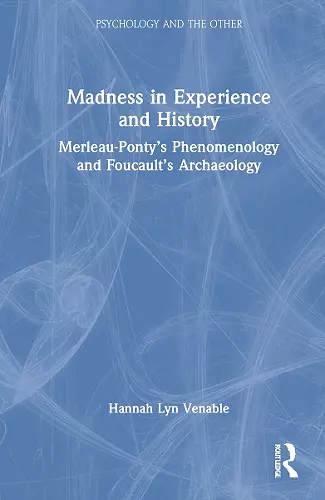Madness in Experience and History
Merleau-Ponty’s Phenomenology and Foucault’s Archaeology
Format:Hardback
Publisher:Taylor & Francis Ltd
Published:2nd Nov '21
Currently unavailable, and unfortunately no date known when it will be back
This hardback is available in another edition too:
- Paperback£35.99(9781032020280)

Madness in Experience and History brings together experience and history to show their impact on madness or mental illness.
Drawing on the writings of two twentieth-century French philosophers, Maurice Merleau-Ponty and Michel Foucault, the author pairs a phenomenological approach with an archaeological approach to present a new perspective on mental illness as an experience that arises out of common behavioral patterns and shared historical structures. Many today feel frustrated with the medical model because of its deficiencies in explaining mental illness. In response, the author argues that we must integrate human experiences of mental disorders with the history of mental disorders to have a full account of mental health and to make possible a more holistic care.
Scholars in the humanities and mental health practitioners will appreciate how such an analysis not only offers a greater understanding of mental health, but also a fresh take on discovering value in diverse human experiences.
"Madness in Experience and History is extremely impressive. Its exploration of the overlaps and similarities between the respective positions of Merleau-Ponty and Foucault is fascinating and serves to shed genuinely new light upon 'madness'. Hannah Venable is to be congratulated for maintaining an impeccable clarity of focus and style whilst delving so deeply into the intricacies of both her subject matter and the perspectives of her chosen interlocuters. I recommend this to anybody with an interest in Merleau-Ponty, Foucault or mental health." — Nick Crossley, professor of Sociology at The University of Manchester, author of The Politics of Subjectivity: Between Foucault and Merleau-Ponty
"In challenging reductive psychological accounts of mental illness, Hannah Lyn Venable fruitfully integrates two traditions often seen as opposed: phenomenology and Foucauldian archaeology. A consequence of what Foucault calls "the great confinement" of the mentally ill is that madness, in modernity, is reduced to an object of scientific knowing and thus deprived of its own speech, the power of expressing its own meaning. By paying close philosophical attention to the nonrational, the tragic, the "deep wounds present in all experience," Venable offers a powerful rejoinder to this ostracism and suppression. Her excellent book affirms the inescapable chiasms of mind and body, the rational and the nonrational, and thereby powerfully enriches our understanding of reason." — Scott Marratto,associate professor of Philosophy at Michigan Technological University, author of The Intercorporeal Self: Merleau-Ponty on Subjectivity
"Hannah Lyn Venable’s tremendous study of Merleau-Ponty’s phenomenology and Foucault’s archeology illuminates the intersection between embodiment and history. Madness in Experience and History: Merleau-Ponty’s Phenomenology and Foucault’s Archaeology provides a valuable addition to scholarship integrating phenomenological psychology and post-structuralism. Venable does not commit the error of conflating one thinker as a minor complement to the other, but instead retains their individual contributions in order to provide a compelling manner in which to address psychological phenomena and to provide sensitive mental health care." — Talia Welsh,UTAA Distinguished Service Professor and UC Foundation Professor of Philosophy and Women, Gender, and Sexuality Studies at the University of Tennessee at Chattanooga, translator of Merleau-Ponty’s Child Psychology and Pedagogy, author of The Child as Natural Phenomenologist: Primal and Primary Experience in Merleau-Ponty’s Psychology
"Merleau-Ponty’s precision analysis of the lived body and experience, and Foucault’s sweeping yet detailed history of psychiatric disorders have much to tell us about our understanding of psychopathology. Hannah Lyn Venable brings these two thinkers together to flesh out the connections between the phenomenological dimensions and the larger social and cultural structures, and to provide new, fresh insights into what is missing in contemporary medical accounts of madness." — Shaun Gallagher,Lillian and Morrie Moss Professor of Philosophy at University of Memphis, author of How the Body Shapes the Mind
ISBN: 9781032020297
Dimensions: unknown
Weight: 453g
244 pages